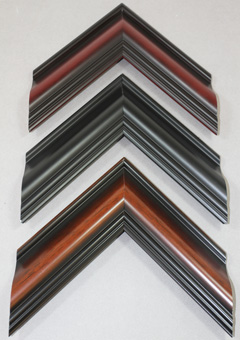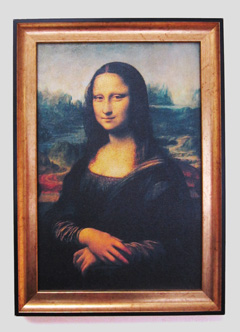| CUSTOM FRAME ORDERS: MISTAKES TO AVOID |
 |
|
As more and more custom frame companies trade in their brick and mortar shops for online alternatives, both those new to the framing world and those who have been ordering framed art for years can be stumped and thrown off by the sudden lack of physicality involved in the ordering process.
The following tips can help avoid some common mistakes made when ordering a picture frame. Though this article is geared toward online frame shops, many of these tricks may be useful to those who still patronize storefront shops as well.
|
SUMMARY
For every part of the online picture frame ordering process that can potentially go wrong, there is an easy solution.
| MISTAKE |
SOLUTION |
| Computer monitor vs. Real world colors |
Order frame corner samples, or speak to the framer about your choices. |
| The Dimensions of the Frame |
Measure and measure again. If your frame is the wrong size, contact the frame shop. |
| The Frame Itself |
Study the given specifications carefully to make sure the frame is right for your artwork. |
| Overshooting your Budget |
Only look at frames within your price range, or consider a simpler option if your first choice is too costly. |
| Archival vs. Regular Components |
Only choose archival mats, glazing, and backing if you really need them. Regular components are still excellent quality. |
| Ordering in a Rush |
Leave yourself plenty of time between when you get your frame and when you need it. If there's no alternative, be prepared to pay more for a rush order. |
| Lack of Communication |
If you have questions about the materials, your choices, or your order in general, always consult the framer. They are an expert in their field and happy to help. |
|
| COLORS ON THE SCREEN
|
 |
|
If you have ever ordered anything in a certain color from an online retailer like Amazon or eBay, you are likely aware that the color you see on your computer monitor when you add that item to your shopping cart is often not the color of the object you pull out of the box.
And yet, many people order a picture frame and mat for an existing artwork, only to be shocked that it doesn't perfectly match their artwork when they receive it.
Frame shops offer corner samples for a reason, and this is it. Even storefront shops offer corner samples if you are unable to bring your artwork into the shop - you take home a few samples and place them against your piece, and choose the one you like. But in the case of online stores, this is even more important.
Further to this, if you are ordering multiples or a large quantity of the same frame for themed decor, a gallery exhibit, or another extensive project, it is highly advisable that you order a corner sample or even a smaller size of the moulding you want before placing your large order. Neither side of the transaction will be happy if your mass shipment of frames turns out to be different than you expected. If you do not take this preventative step, we are only able to offer a maximum refund of $250.
Most online shops, KeenART Media included, will charge a small fee plus shipping for your corner sample, but will refund the shipping if you decide to order a frame. We provide this deal for up to five corner samples, and you can place a sample order by clicking beside "Need sample?" at the bottom of any frame moulding page (example in the link).
Though this option is rarely advertised, ordering a mat sample is generally a good idea as well. If you are adding a matboard to your artwork, matching the mat is actually more important than the frame, since it sits directly beside your image. Talk to your framer - they will probably be happy to send some mat samples for a nominal fee, along with your frame sample.
|

Frame corner samples
|
| THE WRONG SIZE
|
 |
PICTURE FRAMES
Ordering a high quality picture frame only to discover it doesn't actually fit your artwork or photograph can be upsetting. It is, however, a fairly simple error to avoid.
First of all, make sure you look at all the specifications available to you online, for your chosen frame.
Frame Face Width
This is the part of the frame that will be visible when your image is viewed from the front. In most cases, smaller images will have narrower frame faces, while larger images will have wider ones. This isn't a hard and fast rule, but it is both a practical and aesthetic suggestion: a very thin frame around a large artwork might not be able to support the combined weight of the artwork, plexiglass, mat, and backing. So don't let yourself fall in love with the decoration on a 1-1/2" frame unless you're sure it won't look flimsy around your 40x36" image.
Frame Depth/Height
Though usually less important than the face width, it is still important to know the height (sometimes called the depth) of the frame. This measurement dictates the amount your frame face projects from the wall, and may affect the existing decor in the room where you plan to hang the art more than the artwork itself. Frame depths can range from a 1/2" to as much as a few inches.
Rabbet Depth
Closely connected to the frame height, the rabbet depth is the distance between the very back of the frame, and the back of the extended lip; in other words, the space in which your glazing, art, and backing will lie. It doesn't really matter if this measurement is wider than the thickness of the frame contents, but if it is narrower (if you have a triple mat or a very thick artwork, for instance) your contents will stick out the back of your frame and could cause problems.
Determining the Frame Size
Measure your artwork. Make sure the part you are measuring is the part you want to actually show in the frame. If your image has a white border that you want to cut off or hide behind a mat, then don't measure that part. It is best to measure along the very edges, so you have the edge of the art as a guide to ensure the tape is straight.
Once you're recorded the measurement, walk away for a few minutes. Then come back and measure your artwork again. Make sure the numbers match. Then measure a third time.
If this sounds like a lot of unnecessary steps, just think about how relieved you'll feel that one time you catch an error with your second measurement. These few extra minutes are worth avoiding the hassle and added cost of dealing with return shipping and ordering new frames. If the mistake is yours, most frame shops will not refund your purchase.
If you happen to receive a frame that is the wrong size due to a framer's error, contact the business right away. Lay a measuring tape across the back of the frame, showing the dimensions from each raised edge behind the lip (this is how the size is measured). Send them this image and let them know the mistake. At KeenART Media, we take great care with our frames and are happy to correct any errors on our end.
Some additional measurements to keep in mind:
- We add 1/8" to the artwork size you gave us when we make the frame. This is to allow for any shifting of the contents or mis-measuring. While this will not make a different in your measurement, it will add 1/4" to the total size of your framed piece.
- We cut mat openings 1/8" to 1/4" smaller on each side than your artwork size. This is to ensure any slight shifting will not show the white border of your artwork, and to keep your art from falling through the mat.
- When creating floater frames, we generally cut them to be 1/4" larger on each size than your artwork size. This allows for the visually pleasing, shadowed gap between the edge of the artwork and the frame. Don't worry - the back lip of the floater frame is always wide enough to safely hold your canvas in place.
FLOATER FRAMES
A canvas floater frame is designed to border stretched canvas prints, and the back of the mounted canvas sits inside, rather than the edge overlapping the art. Generally, you would measure the art for a floater frame the same way you measure art for a regular frame, with the added measurement of the depth, to ensure you canvas won't stick out beyond the frame.
However, if the canvas you are framing is old, or has been in storage, or was stretched on inexpensive stretcher bars, it may have skewed over time. In this case, your canvas does not have right angle corners, and will probably not fit in the frame. There are ways to fix this problem (see Measuring a Stretched Canvas in our How to Measure Your Artwork article), but for this article, we'll just explain how you know it is skewed.
Instead of measuring the height and width of your canvas (though you can do this, too), measure from the top left corner to the bottom right corner, and from the top right corner to the bottom left corner. If these measurements are not exactly the same, there's a good chance your canvas is skewed.
MAT WIDTH
Be sure to put some thought into how thick you want your mat border to be. Generally speaking, a mat of less than 1-3/4" ends up looking like a stripe around the edge of your artwork, and can detract from it. Our article Measuring For Mats has a useful section on the "ideal" mat width, as well as a chart that can help determine the minimum width your mat should be.
Once you have put in all this legwork to make sure you are ordering exactly what you want, don't forget to check over the details of your order summary before you submit your order. If you have accidentally ordered an 8x10" frame with a 3" mat (leaving you with space for a 2x4" image - oops!), the framer will not necessarily assume you have made a mistake, and you could be stuck with an expensive extra frame.
Remember the difference between mats and linen liners. A mat is intended to be displayed between the image and the glazing, and can be cut to any size and border width up to a 32x40" outer size.
A linen liner serves the same general function as a mat, but is used for stretched canvas art in a traditional frame with no glazing. They are made from wood instead of cotton/paper, and come in standard widths and colors, though the long moulding lengths can be cut to any size.
If you require a mat for an artwork with glazing but it is too large for a matboard, it is possible to use a linen liner. However, the rabbet must be deep enough to hold the artwork, backing, glazing and wood liner.
|

This frame is too large for the image

This mat is too thin for the image

This mat is a good size for the image

Linen liner with a frame
|
| OVERSPENDING
|
 |
STYLE
There are some incredibly beautiful, distinctive and ornate frames on the market. If you are framing a classic painting or very special original piece, one of these frames may be exactly what you need.
However, if you punch in your measurements online and are knocked over by the price of the thick, detailed frame you want, there's no shame in considering a simpler style. Work within your budget as you browse online, because once the frame is ordered, you're usually stuck with it!
ARCHIVAL
Some people think that any frame components that aren't archival or conservation are cheap and poor quality. This is simply not the case.
If you are framing a painting for a customer, or you work for a gallery, than you always want to select archival glazing, mats, and backing. The piece will probably be displayed for the buyer's entire lifetime, and very possibly be passed down through generations. By outfitting the artwork with archival touches, you are ensuring the lifespan of the work for centuries.
However, if you are framing family photographs in simple frames, or children's artwork that might be taken down or replaced once they move away from home, you don't need to splurge on the more costly frame components.
"Regular" plexiglass, matboard, and backing might not last until the end of time, but it doesn't disintegrate in a few years, either. Our Peterboro regular matboards are acid-neutralized, which means that while the wood pulp from which they were made does have potentially damaging chemicals in it, it will not affect your artwork for about 100 years.
Likewise, our regular glazing is still flawlessly clear, high quality acrylic glass that will not shatter and will protect your artwork from dust, fingers, and humidity. The only difference is that it is not UV-protected, meaning that it will not prevent direct light rays from fading your image over many years. Keep the framed piece out of direct sunlight, and you're unlikely to even notice any fading for decades.
|

Consider selecting a similar, but simpler frame
|
| ORDERING IN A RUSH
|
 |
|
This mistake ties into all the other mistakes above: If at all possible, leave yourself plenty of time between ordering and when you require your frame!
If you order a frame and the earliest it can arrive is the day you need it, you might want to consider buying from a local store. Even if everything is perfect, you are still causing yourself a lot of stress by ordering so close to your cutoff date.
Sometimes, orders get delayed if materials are not in stock, or if a certain product takes longer to prepare. While the shop will do their best to let you know, this can throw off your plans. And even if everything goes well at the shop, weather or other issues - uncontrollable by you or the framer - can delay the delivery of your package. It is always best to leave at least a few days between the expected receipt of your order and the date of your event.
Finally, if you do need the business to rush your order, don't be surprised if it costs you extra. Other orders must be put on hold in order for yours to be finished first, and extra time may be necessary for the framer. At KeenART Media, we charge 20-40% extra to rush production of your order, and a second fee to upgrade to express shipping.
|

|
| THE FRAMER IS YOUR FRIEND
|
 |
|
If you have any questions at all - is this frame really this color? What do these measurements mean? Am I doing this right? - talk to the framer. Sometimes in online ordering, you just need to consult with a real human being, especially when you're ordering something as finicky as a picture frame. If the company seems receptive, send a picture of your artwork and ask if they think your selections are fitting. There is always room for personal taste, of course, but framers have seen thousands of finished pieces and know what to look for.
If you are ordering from a custom framing website that does not have customer service - order from a different website! Just because you can't walk into their store doesn't mean they shouldn't be available to assist you in making the best choice possible.
At KeenART Media, we are always happy to offer advice and suggestions. Just contact us with your enquiries or concerns, and our knowledgeable staff with help you out.
|

A finished framed piece
|
|
While there are certainly things that can go wrong when ordering a picture frame online, there is usually a simple way to fix or deter each of these potential problems.
|
|
© 2002-2025 - KeenART Media Ltd.
|
|
| |
|

